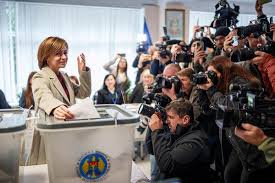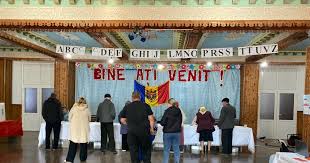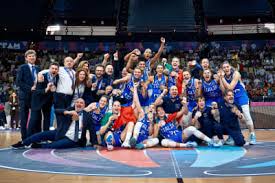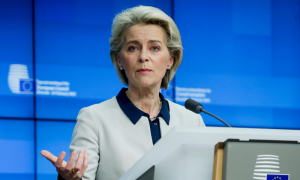Moldova in shock following the EU membership referendum

It is 10.30pm in Moldova, and the first results of the referendum on European integration are in. 43.74% in favour, 56.26% against. A shiver runs down my spine as my face and those of my friends turned to stone. A shock. To reassure ourselves, we tell each other that not all ballots have been counted yet, that as – the sticker on my phone says – ‘nimic nu este pierdut’ (‘nothing is ever lost’ in Romanian). But as the hours go by, and as the bottle of wine that accompanies our lamentations slowly empties, the results don’t change significantly: the ‘no’ is still ahead. It is therefore with anxiety that we head off to bed – if only to get some sleep. In the early hours of the morning, the tide turned and the ‘yes’ side was leading with 50.07%. But everyone was scarred from a short and difficult night. Incomprehension is the feeling that dominates the hearts, and the word rușine (shame in Romanian) the one that dominates social networks. One question is in all our mind: is Moldova as pro-European as we thought?

A disappointment worthy the expectations
Pro-Europeans from Moldova and abroad were stunned in the aftermath of the referendum. The victory of the ‘yes’ vote to enshrine the objective of integrating the EU in the Constitution was achieved, but only by the narrowest of margins. An unexpected result in a country often presented as a model of pro-Europeanism. Since 2022, it has been speeding through the various stages of EU accession, from obtaining candidate status to opening negotiations this year. The collaboration between a pro-European president and a parliament with an absolute pro-European majority also enabled Moldova to make rapid progress on the reforms. European investment has therefore increased in the key sectors of education, health, infrastructure and energy, enabling the Moldovan people to overcome the various crises of recent years with relative peace of mind. The public also seemed to have taken up the cause, with pro-European demonstrations mobilising large numbers of people, and opinion polls showing widespread support for EU integration. In short, all the indicators were positive and hopeful. This made shock of Monday morning, when the ‘yes’ vote won by the slimmest of margins, was even bigger,. So how can we explain this result?
Time for introspection
One easy explanation for this result would be to blame it on Russian interference, which has increased in scale in Moldova in recent months. A recent journalistic investigation by Ziarul de Garda brought to light a complex 39 million dollars scheme of electoral corruption organised by the fugitive pro-Russian oligarch Ilan Shor. According to Moldovan Police Chief Viorel Cernăuțeanu, at least 130,000 voters received money in exchange for voting against the referendum and for Ilan Shor’s favorite presidential candidate. Moldova has also been the target of vast disinformation campaigns against the European Union, aimed at discrediting the local authorities by disseminating false documents, deep-fakes and rumors in the public space. But is it credible to think that the vote of 738,737 voters (’no’ voters) could have been influenced solely by Russian interference? Undoubtedly not.
The pro-European political parties and civil society need to reflect on this relative failure, which took place in an economic and political context that is unbelievably favorable to them. Did they sit idly, thinking the victory in the referendum was a sure thing? Expecting a boycott of the referendum by the opposition, did the pro-Europeans ignore the unconvinced and concentrate too much of their efforts on the already-convinced electorate? Certainly, the pro-European communication has been somewhat at fault, too technocratic, relying on numbers and statistics to illustrate the European Union’s accomplishments in Moldova, but which were too inaccessible to the average person.
A good example of this are certain giant advertising billboards standing on the side of the roads, showing the growth curve of the Latvian economy (which we can see taking off after accession to the EU), and the growth curve of Moldova (which is far less impressive). Without a slogan or blue flags bearing yellow stars, it’s not easy to understand the subtext of the billboard: accession to the European Union brings growth! Without falling into the populist rhetoric proposed by the pro-Russian political forces, the pro-Europeans must find a narrative that appeals more to the people. Another explanation for the result could be a protest vote. Although difficult to calculate at the moment, could it be that some pro-Europeans refused to vote in favour of the referendum to punish Maia Sandu’s initiative of holding it so early in the EU accession process and at the same time as the presidential election? Some pro-European opposition parties promoted this strategy. Explanatory factors for the vote can therefore be found in these three components: massive Russian interference, a poorly handled campaign by pro-Europeans forces, and the emergence of a protest vote.
An outcome that should not be underestimated
Despite all these factors, a pragmatic analysis of the results reveals a few rays of sunshine. Firstly, the referendum passed and the strategic objective of joining the EU will be enshrined in the Moldovan Constitution. This result and victory should not be underestimated in the context of the massive Russian interference described earlier. A victory is a victory, and Moldova continues its way towards the EU. As far as the presidential elections are concerned, Maia Sandu can also take satisfaction in the fact that she scored better than in 2020 (+34.7% of votes). However, the incumbent president doesn’t seem to have any reserve votes available for the second round (the other pro-European parties won a small amount of votes), whereas Alexandr Stoianoglo, her opponent in the second round, should benefit from a rallying of the other pro-Russian candidates. For Maia Sandu, the only hope now is that the referendum result will act as a warning signal to mobilise voters who abstained in the first round to vote in the second round. Finally, and perhaps most importantly, the close result of this referendum may serve as a wake-up call for the pro-European movement in Moldova. While nothing is ever lost, nothing is ever won in advance either. On October 20th, Moldova almost lost. The road to European integration will be long and full of hurdles, and Moldova’s success will depend on the ability of pro-Europeans to relentlessly convince the Moldovan population of the desirability of this cause. Easier said than done!
In these challenging times, I want to share our full support to our Moldovan friends who are fighting for Moldova’s European future. These friends who have been campaigning for months, who have travelled thousands of kilometers, who have dedicated entire weekends, who have debated for hours on end, sometimes losing friendships and relationships in the process, to share with others the hopes they have for a European future for Moldova. This referendum was decided by a few thousand votes, and you can be sure, dear friends, that some of them are the result of your efforts. This victory is also yours, congratulations, and all the best on the road to European integration!





